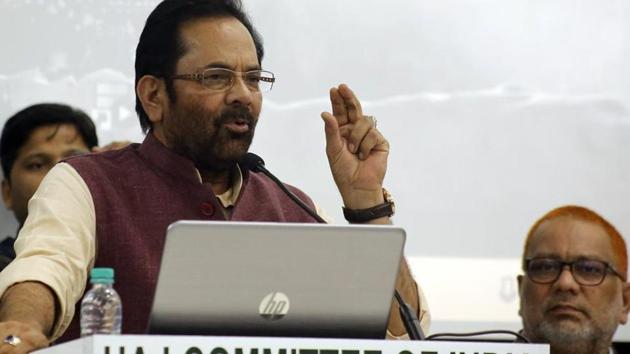‘J-K move has support of common people, isolating the naysayers’: Naqvi
The decision has the support of the common people of Jammu and Kashmir, said the Union Minister.
Aadhaar cards, Jan Dhan accounts and digitised Waqf properties will be part of the Centre’s outreach in Jammu & Kashmir and Ladakh, Union minority affairs minister Mukhtar Abbas Naqvi said in an interview to HT. Edited excerpts:

Q. Where does the prime minister’s ‘sabka vishwas’ promise fit in the Kashmir Valley post the nullification of Article 370? Especially since the area is under curfew and Eid is round the corner…
The decision to revoke Article 370 has been taken in the interest of Jammu, Kashmir and Ladakh, as well as the whole country. When the government took the decision, pilgrims were on their way to the Amarnath temple, and yet, the thought that the decision should be implemented after the Yatra is completed was not entertained. As far as Bakra Eid is concerned, the prime minister has said in his address on Wednesday that Eid will be celebrated and people will offer namaz in the Valley. Most importantly, there is a certain amount of trust on PM Modi and home minister Amit Shah, and people believe that only a section of people have tried to make this an issue. The decision has the support of the common people, isolating the naysayers.
Q. As the minority affairs minister, what are your plans to reach out to the people in the region?
In my opinion, some people cloaked themselves under the security cover of Article 370 to continue to help terrorism and separatism prosper. After the demolition of Article 370, 370 problems in the region have ended. Development of common people in the region did not take place as it was contained within a few families; the road to socio-economic development and empowerment is now clear.
Several central schemes did not apply there and in the case of those which applied, the discretion lay with the state government. Kashmiris did not have Aadhaar or Jan Dhan accounts, and schemes like Ayushman Bharat were not implemented. The minority affairs ministry’s scholarship schemes were only partially implemented, even when the minority population of Muslims, Sikhs, Christians and Buddhists were in large numbers. In the coming days, whether it is Jammu, Kashmir or Ladakh, that vacuum will be filled. The adage that Kashmir is heaven will be fully realised now.
After Article 370’s removal in J&K, the Waqf Board Act will now be applicable there, ensuring that the property is used for the community’s benefit. In all the three regions, especially in Ladakh, the gaps under the Pradhan Mantri Jan Vikas Karyakram will be addressed. The ministry has identified certain areas, such as Durbok, Nyoma and Panamic blocks in Leh district in Ladakh, Shakar Chiktan, Zanskar, Lungnak, and Shargole in Kargil district, Qazigund in Kulgam district and Jammu in Satwari district as focus areas. In these areas, the development of hospitals, schools, colleges and community centres will be taken up on a war footing.
Q. The BJP’s criticism of the Congress has been that it indulged in minority appeasement. How has the BJP fared differently?
Appeasement means that you only keep people happy without letting real development percolate. For us, as per the government’s motto, the economically weaker sections (EWS) of the six notified minority communities of Muslims, Sikhs, Jains, Parsis, Buddhists and Christians, should have development with dignity and without appeasement. Be it Leh, Kargil or Srinagar, for the educational empowerment of the EWS sections, scholarships were not reaching. I will personally visit these areas for an outreach.
The Muslim Women (Protection of Rights on Marriage) Act, or the triple talaq act was passed this session. The legislation has been criticised on the ground that the BJP is looking at Muslim votes through this, and so, has meddled with the Uniform Civil Code.
The perception that the Uniform Civil Code has been touched is a wrong one. Muslims nowadays hold modern values dear. Triple talaq is an outdated practice, and it has no place in Islam today. The triple talaq act is a reform. It is a social evil and Muslim women will benefit from it. There has been no notable reaction on the legislation’s passage.
Q. When AIMIM MP Asaduddin Owaisi took oath, he was greeted with chants of ‘Jai Shri Ram’. Your thoughts?
In villages, people greet each other with ‘Ram, Ram’. In the same manner, ‘Jai Shri Ram’ is a greeting, it is not an abuse. People who look at it with a negative mindset can never be happy. Perhaps, in return, one can always say, ‘Salaam Walaikum’.
Q. What are your ministry’s plans as part of its 100-day agenda?
About 85% of the 6 lakh Wakf properties around the country have been digitised and we plan to digitise all of them. We are doing a geo-mapping of these properties with the help of IIT Roorkee and Aligarh Muslim University. This will help Wakf properties within litigations by helping them upload their land documents online for better transparency…
The Haj pilgrimage has been digitised fully, both here and in our consulate in Saudi Arabia. We have made it a seamless experience with e-visas and preloaded SIMs. More than 2 lakh Indian Muslims are going on the pilgrimage this year without Haj subsidy.






